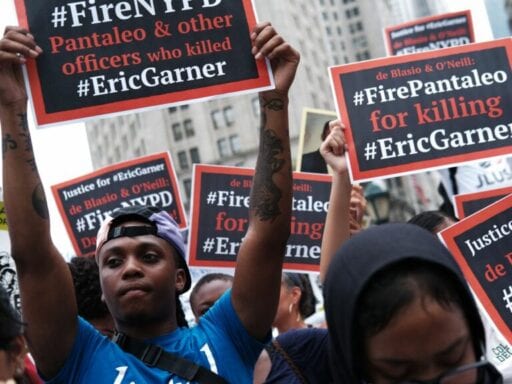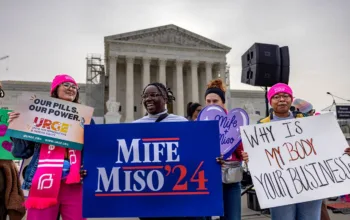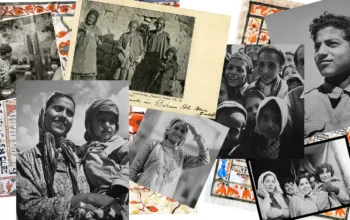The NYC mayor hopes his policing record can make him president, but critics want him to fire Daniel Pantaleo first.
On July 16, the Department of Justice announced that NYPD officer Daniel Pantaleo would not be prosecuted for the death of Eric Garner, an unarmed black man whose cries of “I can’t breathe” during a 2014 arrest became a rallying cry for the Black Lives Matter movement. In the weeks since, the agency has faced intense criticism from Garner’s family.
“The DOJ has failed us,” Garner’s mother, Gwen Carr, told reporters the day of the agency’s announcement.
But the family has also had sharp words for New York City Mayor Bill de Blasio. They’ve said that the mayor needs to fire Pantaleo, who has remained on paid desk duty in the five years since Garner’s death. De Blasio has also been criticized for his decision to wait years before starting formal disciplinary proceedings against the officer (those proceedings finally began in May of this year). On July 17, activists pledged to continue public demonstrations for 11 days in protest of Pantaleo’s continued employment.
The mayor has responded to the criticism by noting that the law does not allow him to fire Pantaleo, adding that the officer’s fate is up to NYPD Commissioner James O’Neill. But even before then, de Blasio has been criticized for the city’s handling of the Garner case overall, with critics arguing that his administration failed to act several times as the case unfolded.
“We’re here today because for 1,827 days, @NYCMayor made a conscious decision to allow Officer Daniel Pantaleo to enrich himself off the murder of #EricGarner. You wine and dine in your mansion while the family grieves in the street.” @KirstenJohnFoy #FirePantaleo #FireNYPD pic.twitter.com/3QHcH6MZ19
— CPR Change the NYPD (@changethenypd) July 18, 2019
The very public criticism comes as de Blasio, who is currently mounting a long-shot presidential campaign, touts his record on police reform issues. He most recently discussed the topic during the first Democratic primary debates in June, saying that the country needs to engage in “a different conversation about policing.”
During the second Democratic debates on Wednesday, a group of protesters interrupted the opening statement of Sen. Cory Booker (D-NJ), calling for Pantaleo to be fired.
Protestors are yelling “Fire Pantaleo,” and they’re right. Eric Garner was killed 5 years ago, and Pantaleo is still employed by the NYPD. Not only does he need to be held accountable, but these candidates also must now present a real vision for criminal justice reform #DemDebate
— Rashad Robinson (@rashadrobinson) August 1, 2019
To the folks who were standing up to Mayor de Blasio a few minutes ago—good for you. That’s how change is made. #DemDebate https://t.co/zix0UzmZFa
— Cory Booker (@CoryBooker) August 1, 2019
As de Blasio works to tout his record on policing, Pantaleo’s continued employment has raised the question of if the NYC mayor should be the one leading a necessary political discussion about policing and police reform. Activists and Garner’s family say that until Pantaleo is fired, the answer to that question is no.
“The DOJ made their decision. We are looking for de Blasio to make his,” Carr said in July. “We want him to stand up as the mayor he’s supposed to be.”
“The No. 1 way you can honor Eric Garner is firing Officer Pantaleo”
Due to a five-year statute of limitations on the case, the DOJ had until July 17 — the fifth anniversary of Garner’s death — to announce what charges Pantaleo would face. On Tuesday, the agency ultimately decided that there was “insufficient evidence to prove beyond a reasonable doubt” that Pantaleo intentionally harmed Garner when he allegedly placed the 43-year old father of six into an NYPD-prohibited chokehold.
In recent days, de Blasio has blamed the Department of Justice for how Garner’s case was handled. “Years ago, we put our faith in the federal government to act,” he said in a July 16 statement. “We won’t make that mistake again.”
De Blasio has also said that he cannot fire Pantaleo. And legally, he is right: the power to terminate the officer rests with O’Neill, who is currently waiting for an administrative judge to submit recommendations on if Pantaleo should be fired. Even so, some New Yorkers continue to argue that de Blasio’s office could pressure the NYPD to make the call sooner.
While the law means that de Blasio doesn’t have the power to immediately fire Pantaleo, that doesn’t mean that the mayor has been completely powerless over Garner’s case. A big reason why it took nearly five years for the NYPD departmental trial was that de Blasio wanted the DOJ investigation to end before the city started the disciplinary hearing process. It wasn’t until 2018 that the city changed its mind, saying that it waited because the DOJ asked it to, and that it would move forward because the investigation had taken too long.
The mayor has continued to stress that he cannot intervene in the disciplinary process, and has declined to say if he thinks Pantaleo should be terminated. “We’ve got to give people due process,” de Blasio told New York’s Hot 97 radio station in July. The “No. 1 way to honor Eric Garner,” he added, is ”to make sure there isn’t another instance like this.”
But radio host Ebro Darden challenged that claim, telling de Blasio that “the No. 1 way you can honor Eric Garner is firing Officer Pantaleo.”
Some New York City officials have made similar statements. Scott Stringer, the city comptroller, has said that it is “an outrage that Officer Pantaleo has not been fired.” Corey Johnson, the speaker for the New York City Council, said in a statement that “Pantaleo does not deserve a pass, he needs to be fired and so do the other officers involved in this case.”
And on July 17, New York Gov. Andrew Cuomo told reporters that the Garner case “is an issue that should have been handled by the New York authorities much earlier on.” But he declined to say if he also thought that Pantaleo should be terminated, saying “that’s a decision for the NYPD and New York City.”
As the New York Times reports, de Blasio has said that he is “not going to listen to a bunch of politicians.” Shortly after the DOJ released its decision, his office announced that, unless explicitly requested by the family of a victim, the city would no longer wait for the results of a DOJ investigation to begin disciplinary hearings against an officer involved in the death of an unarmed civilian.
De Blasio’s presidential campaign has touted his record on policing. The Garner case calls that record into question.
While de Blasio’s unpopularity among some New Yorkers has existed for years, this current criticism matters for two reasons. The first is that the anger over the Garner case fits into a bigger frustration about police accountability five years after stories of police violence first grabbed national attention. Years later, it is still rare for officers to be prosecuted and convicted for misconduct. For Garner’s family, their anger over this lack of accountability has been compounded by the fact that they had to wait years for the investigation to close.
/cdn.vox-cdn.com/uploads/chorus_asset/file/18320112/EricGarnerProtest.jpg) Spencer Platt/Getty Images
Spencer Platt/Getty ImagesThe second reason has to do with de Blasio’s presidential campaign. While de Blasio’s presidential bid is widely considered to be a nonstarter (he is currently polling at less than 1 percent according to a RealClearPolitics average and pulled in just $1.1 million in second quarter fundraising), the mayor has argued that his police reform record is what sets him apart from other candidates. He also regularly points to his experience raising biracial children to show that he is aware of the ways policing can negatively affect black and brown communities.
The Garner case calls some of those arguments into question.
De Blasio’s record — and the state of police-community relations in New York City — is mixed. It is true that de Blasio’s tenure has seen the NYPD change some practices. After Garner’s death, the agency stopped assigning rookie officers to areas with high crime, and also announced a $35 million mandatory officer training program.
The city has also moved to end “stop-and-frisk” policing, which saw officers search black and Latino men across the city (though significant racial disparities in stops remain). But reports from New York City’s Department of Investigation have found that years after these changes, and as arrests and crime in the city fall, the NYPD still deals with complaints of excessive use of force, and many more of racial bias.
As de Blasio promoted reform in the city, Eric Garner’s family criticized the decision to postpone disciplining Pantaleo. When de Blasio said that the city could not release Pantaleo’s disciplinary records in 2016, Garner’s oldest daughter, Erica, blasted the mayor in a series of tweets. Carr, Garner’s mother, said that she could not vote for de Blasio after the mayor declined to support a bill that would create criminal punishments for police officers who use chokeholds.
With the DOJ decision, attention now turns to the NYPD commissioner who is still waiting to receive a judge’s recommendations after the May departmental trial. City officials say O’Neill will make a decision on Pantaleo’s employment by August 31, according to the Associated Press.
But the pressure on de Blasio is unlikely to let up. Jumaane Williams, the public advocate for New York City, said in July that de Blasio must “do something, or don’t mention Eric Garner’s name ever again.”
“You cannot be president, you cannot be the Democratic nominee, if Daniel Pantaleo is still on the force,” he added.
Author: P.R. Lockhart
Read More



